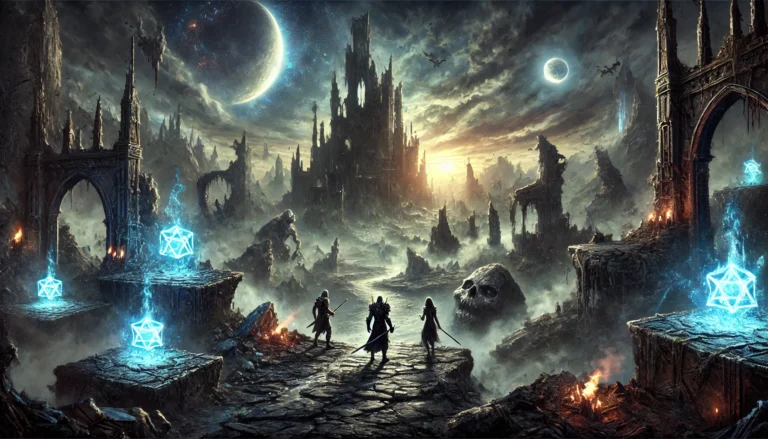The House with the Blue Door
Chapter 1: The Earth Does Not Forget
Part One: The Threshold
Morning fell slowly over the hill, as if even the sun hesitated to cross the dusty windows of the house with the blue door. There was a heavy stillness in the air, the kind that comes before a storm, though the sky was clear. Matilde Barragán had woken before the first rooster crowed—not out of habit, but because of the dull creak of wood dreaming in its joints. It was an old house, like her body, no longer able to keep secrets without something inside complaining.
She rose without turning on the light. She knew every loose board by heart. The same routine: bathroom, kitchen, coffee in the clay pot. She sat in the chair by the window, where every morning—for the past seven years—she waited without truly waiting.
On the table, the checkered cloth still bore a wine stain that never quite washed out. In front of her, the empty plate she continued to set out by instinct. Aurelia’s.

She didn’t say the name. She only thought it. Speaking it was to summon the wound. She preferred to stay silent, the way one does with pains that no longer heal. She had learned to live like that: in limbo, between what was and what should’ve been. Her daughter had left one September afternoon, shouting words Matilde couldn’t—or wouldn’t—respond to. Aurelia had left like a dry branch breaking: sudden, without warning, without looking back.
Since then, the house had been a sealed box with memories loose like dust in the corners. Nothing had changed. Aurelia’s room remained untouched: the old perfume in the drawer, the stacked books, the red scarf hanging behind the door. Matilde cleaned the room every Thursday, as if redemption could be found in repetition.
But that morning, something was different. A deeper silence. A premonition. The coffee tasted bitter. The wind carried dry earth and the distant scent of weeds. And then she heard it: gravel crunching. Someone was walking up the stone path. Slowly. With hesitant steps.
Matilde froze, the cup halfway between the table and her mouth. It wasn’t a day for visitors. No one came to that house. Not in a long time. And if they did, it was by mistake.
She stood up, took the small kitchen knife—not out of fear, but out of habit—and peeked through the curtain slit. She saw him then. In the distance, a lone man. Thin, with a backpack slung over his shoulder and the weary gait of someone carrying more than his body. Matilde narrowed her eyes. There was something familiar about him. A feeling that stung before she could place it.
When the man was a few steps from the door, she had already put down the knife and run her hands through her graying hair, trying to steady them.
He didn’t knock. He just stood there. And in a low voice, almost like he was speaking to the wind, he said:
“Matilde.”
She opened the door. She didn’t say his name. She didn’t ask any questions. She only looked at him with the hard gaze of someone who’s forgotten how to show emotion. But inside, everything collapsed.
It was Nicolás.
Her late husband’s son.
The one who left when Aurelia was just twelve.
The one who was never hers, but to whom she had given hot soup and long silences throughout half his childhood.
The one who shouldn’t be there.
“I have something for you,” he said, barely above a whisper. “But first, I need to come in.”
Matilde stepped aside. Not because she wanted to. But because she didn’t know how to refuse.
And so, after seven years of solitude, someone crossed the threshold of the house with the blue door once more.
Part Two: The Letters
Nicolás entered slowly, like someone stepping onto sacred ground without permission. The air smelled of old coffee, damp wood, and time that refused to pass. He looked around with the eyes of a child returning to a home he only remembered in shadows. Everything was the same. Even the crack in the wall that started above the pendulum clock and ran down like a frozen lightning bolt.
“Do you want coffee?” Matilde asked without looking at him.
Nicolás nodded slightly. He sat in the chair opposite hers—Aurelia’s place—without knowing, or perhaps knowing all too well.
The sound of coffee pouring into the cup was the only thing heard for several minutes. Nicolás said nothing, as though the words had been trapped in his throat during the long journey. Matilde said nothing either. She just watched him from the corner of her eye, studying the gestures of the man who was no longer a boy, but who still carried something in his posture—something from the child he once was.
“I didn’t think you’d come back,” she finally said.
Nicolás held the cup in both hands, as if needing the heat to keep steady.
“Neither did I. But… I didn’t come for me.”
Matilde raised an eyebrow, barely. Nicolás set the cup down, opened his backpack, and pulled out a wooden box. He placed it on the table with a tenderness that didn’t match its weight.
“This is from Aurelia,” he said quietly. “She left a note. And this.”
Matilde didn’t move. She only looked at the box. One part of her refused to understand. The other already knew.
“Where is she?” she asked. Her voice was a tight string ready to snap.
“She died two months ago. In a hospital in Santa Clara.”
Silence swallowed the room. No sob. No scream. Only a slight tremor in Matilde’s lips, which she quickly masked by taking her cup in both hands. Her knuckles turned white.
“How?”
“An accident. On the highway. Coming home from work. No one knew where she was headed. She had no one… except my address, written on a note. It said: ‘If something happens to me, Matilde should receive this. She’ll know what to do.’”
The box seemed to vibrate on the table. Matilde didn’t touch it.
“What’s inside?”
“Letters. Many. Some for you. Others for people I don’t even know. And one… for me.”
She closed her eyes. For just a second. When she opened them, her pupils were darker.
“Did you read it?”
“Yes.”
“And?”
“She said she didn’t know how to love. That she didn’t know how to stay. That you taught her to be strong, but not soft. And that sometimes, strength looks too much like fear.”
Matilde pressed her lips together. A tear burned in her eye but didn’t fall. It stayed trapped there, like everything else.
“She said that…” she echoed, as if chewing a splinter.
Nicolás stood. He pushed the box toward her with a slow, reverent gesture.
“I came to give it to you. The rest is up to you.”
But he didn’t leave. He made no move to go. He remained standing, hands in his pockets, eyes lowered, unwilling to ask for comfort. Matilde noticed.
“You have nowhere to go, do you?”
He shook his head.
“I was evicted from the room I lived in. The hospital covered the expenses… but not the grief. I don’t know where else to be.”
She looked at him for a long while. Then she stood, walked to the guest room, and opened it. She hadn’t entered it in years. Without looking back, she murmured:
“You can stay. For a few days.”
Nicolás nodded. He slung the backpack over his shoulder, but before leaving the kitchen, he paused.
“She used to say your name. Not with hate. With hunger.”
Matilde closed her eyes. This time, the tear fell. Only one. And it was enough to let everything inside collapse.
When she was alone again, she looked at the box. She didn’t dare open it. Not yet. Instead, she walked to the blue door, opened it wide, and let the wind in.
The house breathed.
For the first time in seven years, it breathed.
Part Four: The Room No One Touched
It was midday when Nicolás paused in front of the door that had always remained shut. Aurelia’s room. He knew it without asking. That corner of the house seemed to hold the air of another time, as if time itself had stopped behind that door. Matilde found him there, hand hovering near the doorknob, as if afraid to cross some sacred line.
“You can go in,” she said, flatly.
Nicolás looked at her, searching her face for some deeper permission. He didn’t find tenderness, but he found something else: surrender. The kind that comes when a person is tired of guarding a tomb with no body.
He turned the knob. The room smelled of clean clothes and worn perfume. Light crept in through a crack in the curtain. Everything was in its place: the made bed, adolescent books lined on a shelf, a calendar forever paused on September seven years ago. The red scarf still hung where Aurelia had left it. It felt like she’d stepped out for a moment and might return any second.
Matilde stood at the doorway. She didn’t enter. She just watched from a distance, as though staring at a portrait and fearing it might vanish if touched.
Nicolás walked slowly, running his fingers along the edge of the desk, over the spines of books, over a bottle of dried nail polish. On the nightstand was a notebook. He picked it up gently. It wasn’t a letter. It was a journal.
“Did you know about this?” he asked.
Matilde shook her head. Her voice took a moment to surface.
“I… never touched anything.”
Nicolás opened it. The first pages were full of lists—books to read, things to do, cities to visit. But later, the handwriting grew tighter, more urgent. He flipped through the pages until he found one folded down at the corner.
He unfolded it. It was another letter, written on different paper. Nicolás read it first silently. Then, as if something compelled him, he handed it to Matilde. She hesitated. But he insisted.
She read it standing, as if sitting would be surrender.
Mama,
If you’re reading this, something must have changed. Maybe Nicolás gave you the box. Maybe you opened the room. I don’t know. But I want to tell you something else. Something I never knew how to scream at you without breaking you.
Sometimes I wondered if you knew I felt like a stranger in my own home. Not entirely your fault. But that silence of yours filled everything. When dad died, I thought we’d grow closer. But you locked yourself inside that version of you that doesn’t cry, doesn’t ask, doesn’t touch. And I became a reflection of that. Two hardened bodies at the same table.
But at night, I heard you talk in your sleep. You said my name. You called for me like when I was little. And then I knew you loved me. You just didn’t know how. I didn’t either.
Forgive me for not coming back. For not opening the door first. But I was scared of looking at you and not knowing who you were. Of finding nothing in common. Until one day, I saw Nicolás at a train station. He recognized me instantly. He hugged me without saying a word. And in that hug, I understood I still had a piece of home somewhere.
He’s family. More than I ever was, sometimes. If you can, don’t let him go. If you can, love him the way you didn’t know how to love me.
Because he left without meaning to.
And maybe, he’ll stay.
I love you. In my own way.
Always in my own way.
—Aurelia
Matilde closed the letter with shaking hands. This time she couldn’t help it. She cried. Not as a release, but as confession. Nicolás came closer, but said nothing. He simply stayed near her, without touching her, with the same quiet presence Aurelia had written with.
There was no comfort. But there was something else: company.
Which, in the language of the broken, is the closest thing to love.
When they left the room, Matilde closed the door.
But this time, she didn’t lock it.
She left it slightly ajar.
Chapter 2: What the Wind Brought
Part One: The Sounds of the Day
The house woke to a new sound: footsteps. They weren’t Matilde’s—firm and measured—but Nicolás’, barefoot, as if afraid to wake someone. It had rained during the night, a faint, whispering rain, but enough to soak the ground with the scent of childhood: mud, damp leaves, living wood. The rooster crowed late. Even the wind seemed to move more cautiously.
Matilde was in the kitchen, chopping onions with the skill of someone who’d cooked alone long enough to no longer expect gratitude. Nicolás entered with messy hair, a shirt that wasn’t his—it had belonged to Aurelia’s father, found behind the guest room door—and eyes still weighed down by sleep.
“Smells good,” he said, not as a compliment, more like a fact.
Matilde didn’t respond, but she served two plates. Eggs, toasted bread, black coffee. He understood it was an invitation and sat down.
They ate without speaking. Nicolás’ fork made a soft click each time it touched the edge of the plate. Matilde didn’t look up. But he noticed how her breathing changed every time the silverware fell silent. As if silence now carried a different weight.
After breakfast, Nicolás went out to the backyard. The soil was still damp. He knelt by the lemon trees, where moss clung to the roots. Matilde watched him from the window. She remembered Aurelia crouching the same way, looking for worms, saying she wanted to be a “plant doctor.”
“The earth doesn’t forget,” she murmured to herself.
By midmorning, Nicolás returned with one of the letters. He had taken it from the box during the night. It was addressed to someone named Don Elías. Matilde tensed when she saw the envelope.
“Who is he?” Nicolás asked.
She was silent for a few seconds.
“A man from town. Worked with her father. Aurelia adored him. Said he spoke to her with respect.”
“Is he still alive?”
“I don’t know.”
Nicolás placed the letter on the table.
“Do you want me to take it?”
Matilde glanced at him with a strange mix of suspicion and relief. She nodded.
“If he’s still alive… tell him to forgive her.”
Nicolás asked no more. He took the rusted bicycle leaning against the shed. Matilde had kept it out of habit, though no one had ridden it in years.
As he pedaled down the hill, she was left alone. The house resumed its usual rhythm, but something had shifted. Silence no longer felt like refuge. It felt like echo.
That was when she decided to open another letter. Not one addressed to her, but one with only a date: March 14. She tore the envelope with more force than necessary, as if needing something to give under her fingers.
Today I dreamed I came back.
That you opened the door and said nothing.
You just looked at me with eyes full of unspoken things.
I sat next to you.
We didn’t talk.
But the silence didn’t hurt.
It was like very soft music.
A new language.
I don’t know if I’ll return.
Some days I feel like I don’t belong anywhere.
Like I’m made of badly stitched pieces.
But even so, there are days—like today—when I want you to know
I never stopped looking toward the hill.
That it hurt to imagine you there, growing old alone,
not knowing I missed you too.
Maybe the only thing I inherited from you
was solitude as a shield.
Matilde let the letter fall onto the table. She pressed her hands against her face. She didn’t cry, but her body folded forward, as if something inside her had cracked just a little more.
Outside, the wind dragged dry leaves across the yard.
And inside, memory began to take the shape of a voice.
Part Two: The Man Who Kept Secrets
The ride downhill to the town was steeper than Nicolás remembered. The air felt different there—heavier, tinged with the sour scent of dry dust and damp wood smoke. The houses, many abandoned or nearly so, leaned slightly, as if bent under the weight of their own stories. Elderly people sat quietly on porches, stray dogs wandered, and clotheslines stretched across yards like tired flags of a fading country.
No one recognized him. Or maybe they did, and simply chose not to say so. In towns like these, silence was also a form of courtesy.
He asked about Don Elías at the grocery shop. The woman behind the counter—weathered skin, nervous hands—looked at him with something between surprise and memory.
“Are you family of Aurelia?”
Nicolás hesitated a second.
“I was her brother. In a way.”
The woman nodded, as if she understood. She gave him the address without asking more.
Don Elías lived at the end of a dirt road, in a house that looked patched together over decades. Faded blue paint peeled from the walls, windows were covered with mismatched curtains, and the garden was little more than dry stems and thorny weeds. Nicolás knocked once. Then again.
An older man opened the door, sun-darkened skin, hunched back, and eyes that still knew how to see.
“Yes?”
“Don Elías?”
“Depends who’s asking.”
“Aurelia Barragán sent me.”
The man stared at him, his gaze sharp and unwavering.
“Aurelia’s dead.”
Nicolás nodded, taking the envelope from his jacket.
“She asked me to give you this.”
Don Elías took the letter. He didn’t open it right away. Just held it between his fingers as if it were a living thing.
“Come in,” he said.
Inside, the house smelled of burned wood and old tobacco. A radio played softly, no words, just guitar strings curling through the air like roots. Don Elías sat in an old chair with wheels that creaked under him. He opened the letter and read slowly, without haste. As he read, his face tightened, not in pain, but like someone unearthing something long buried. When he finished, he sighed—a deep, weathered breath, like he’d waited years to hear those words.
“Did you read it?” he asked.
“No. It’s not mine.”
The old man nodded, a gesture that felt like respect.
“Aurelia used to come here from time to time. In secret, away from her mother. Sometimes she’d sit right there—” he pointed to a half-collapsed wicker chair—“and not speak for hours. Other times, she brought me poems. She never wrote them in front of anyone. But to me, she’d read them.”
“Poems?” Nicolás asked.
“She had a voice like soft stone. Like someone who’s cried with clenched teeth.”
Nicolás swallowed hard. It wasn’t just the image of Aurelia that moved him, but something deeper—the recognition: he too had learned to keep his sorrow on the inside.
“Why you?” he asked.
Elías smiled. A tired, unpretentious smile.
“Because I listened without judging. Because I, too, was young once and wanted to run. Because sometimes, daughters need a father who isn’t theirs.”
Silence settled between the two men like a third guest. Nicolás lowered his eyes.
“Matilde didn’t know about this.”
“Matilde knew. But she didn’t want to know. That’s not the same.”
Don Elías folded the letter carefully and placed it in a wooden box with others. Then he rose slowly.
“Would you like a coffee?”
Nicolás shook his head gently.
“Thank you. I should be getting back.”
“Tell Matilde…” Elías started, then stopped. “No. Better not tell her anything.”
Nicolás stepped outside into the noon sun, sharp and dry, shadows short and brittle. As he pedaled back uphill, the wind dried the sweat on his brow. He carried more than his body up that slope—he carried the certainty that Aurelia had found warmth elsewhere, and somehow, that stung.
At the top of the hill, the blue-doored house waited, not like a mother, but like someone unsure whether to embrace or scold.
He entered without knocking. Matilde was at the dining table, holding another letter.
She looked up.
“Did he take it?”
“He did. And he kept it like it was gold.”
She nodded. Asked no more. Nicolás turned toward his room but paused at the doorway.
“Aurelia wrote poems.”
Matilde said nothing. She lowered her eyes.
And then, for the first time in years, she whispered:
“Like her father.”
Part Three: Voice on Paper
That night, Nicolás couldn’t sleep. It wasn’t insomnia—it was restlessness. A hum beneath his ribs, like something was being born inside him. He left his room with a flashlight and walked barefoot through the house. The air felt heavier after the rain, as if the whole place were suspended in breath.
He passed by Aurelia’s room. The door was ajar. He paused, then pushed it open gently and stepped inside.
The room still smelled like sleeping books. On the nightstand sat the same notebook where he had found her earlier letter. He took it again, but this time, he checked the bottom drawer. There, wrapped in a red scarf, was another notebook—smaller, older. Tied with a black ribbon.
His fingers trembled as he untied it.
This wasn’t a diary. It was filled with poems.
Aurelia’s handwriting grew looser, more intimate. Some pages were entirely crossed out, smeared, scratched over with fingernail and spit. Attempts to say what hurt without naming it. Nicolás sat on the edge of the bed and read softly, aloud to no one.
Don’t talk to me about love like it’s a house.
Houses crack, lean,
fill with people who no longer see each other.
If love exists,
it’s more like the wind—
invisible,
but it tears off doors,
shakes loose old dust,
and slips in through the cracks you tried to close.
My mother keeps her heart wrapped in sandpaper.
Touch her,
and you leave marked.
But if you stay,
the mark becomes a map.
I am hungry for voices that do not command me,
for hands that do not mold,
for silences that hold me.
And I wonder if such things exist,
or if I was raised to fight ghosts.
Nicolás closed the notebook. His eyes were damp. Not only because of what Aurelia had written, but because of how. As if every word were a failed attempt at love.
The next morning, Matilde found the notebook on the kitchen table.
“It was in her room,” Nicolás said. “I didn’t think you’d mind.”
She opened it with stiff hands. She read one, then another. She said nothing. Until her eyes paused on a short, untitled poem. Just a few lines.
You didn’t know how to cry.
So I drowned in your silences.
You didn’t know how to leave.
So I left whole.
You didn’t know how to love me.
So I write,
so someone will love me in pieces.
Matilde dropped the notebook as if it burned.
“That’s not how it was,” she murmured—to herself, to Aurelia, or to the air.
Nicolás said nothing.
A few minutes later, Matilde returned to the box. She took out a different letter. It was addressed to Fernando Barragán, her long-deceased husband. The handwriting trembled on the envelope. She didn’t know whether to open it. But she did.
Papa,
I don’t know if this will ever reach you. Maybe it’s just for me. But I need to say things I never said.
I loved you. Deeply. But I grew up loving you from far away. You were always gone. Sometimes in body, sometimes in spirit. Mama said you were working, but I knew better. I heard things. I heard her crying when she thought we were asleep. I heard the fights under the rain. I heard your silence every time she begged you to look at her.
I never hated you. But I learned too young that love could hurt, and that it was normal for the two of you. For me, it wasn’t. That’s why I left. Because the house was full of unsaid words, of incomplete gestures, of hugs withheld.
I know your death left her lonelier than she admitted. But I also know you carried your loneliness in your pocket, like a handkerchief. Maybe that’s why she learned it from you. And now she lives like that: dry, strong, hard. Like you.
I hope you’re at peace.
And I hope, from wherever you are,
you understand I didn’t want to live like that.
—Aurelia
Matilde closed the letter with clumsy hands. She left it on the table, and without saying a word, went out to the backyard. Nicolás followed, keeping his distance.
She stood by the lemon tree, eyes fixed on the horizon.
“He had another woman in town,” she said, her voice rough and dry. “I knew. But I stayed. For Aurelia. For fear. Because that’s what a wife did.”
“Did she know?” Nicolás asked.
“She always knew. Like I did. But we never spoke of it. How do you explain to a daughter that her father was two different men—one for her, one for the world?”
The wind stirred the branches. A leaf spun slowly to the ground.
“I didn’t know how to love her,” she said at last. “Not the way she needed. But I loved her. With everything I had. It just… wasn’t much.”
Nicolás didn’t speak. But he stepped closer. And, for the first time, placed a hand gently on her shoulder.
She didn’t pull away.
For a moment,
pain was shared.
And in the language of the broken,
that was enough.
Part Four: What Remains on the Page
That night, Nicolás didn’t eat dinner. He locked himself in his room as soon as the sun slipped behind the hills. Matilde didn’t ask. She knew—like mothers do, even when they no longer have small children—that something was happening that could only be done alone.
He sat at the small wooden desk. The notebook was blank. One he had found in a forgotten drawer, its cover still clean, its pages untouched. He opened to the first page. The paper smelled like waiting. He took a pen and began to write—not a poem, not a note—a letter.
His first.
Aurelia,
I’ve never written a letter before. I always thought they were for people who didn’t know how to say things out loud. Maybe that’s why I’m writing now. Because there are things we never said.
I don’t know why you thought of me as a refuge. That scares me. Scares me that you trusted me. I was the son that didn’t quite fit. The one who stayed quiet at lunch. The one who listened behind the walls. The one who learned that silence was the best way not to be a burden.
But you… you were noise. You still are. Even gone, your words echo through this house. I wake up with your voice in my chest. It scares me. It scares me to be loving you now, when you’re no longer here.
But I do. I love you. I loved you since you were the voice defending the stray cat, the girl arguing with teachers, the one who read poetry like throwing stones into a pond.
I love you, even if it’s late.
Even if it hurts.
Even if it burns.
—Nicolás
He folded the letter and placed it in one of the empty envelopes. He left it on top of the box, among the remaining letters. He didn’t know what he would do with it yet. But it needed to exist outside of him.
The next morning, Matilde stepped into Aurelia’s room alone for the first time since her daughter had left. She sat on the edge of the bed, opened the poetry notebook, and picked one at random.
She read it aloud.
Her voice trembled, but it did not break.
Mothers don’t cry in front of daughters.
They learn to tuck tears
into elbows,
into heels,
into the bread they knead at dawn.
Mothers don’t scream.
But some days,
a mother’s silence
is as fierce
as a slammed door without a door.
Matilde covered her mouth. Not out of shame,
but to keep the sob from spilling out too soon.
She remembered shouting once—not with her voice,
but with her back,
the day she turned it to Aurelia for the last time.
That too was a scream.
It just went unheard.
That afternoon, Nicolás found Matilde in the yard, burning dead leaves.
“Need help?”
She nodded, handed him the rake.
They worked in silence, gathering branches, brushing away last season’s remains. When they finished, Nicolás looked at her with something between reverence and tenderness.
“What do we do with the letters that are left?”
Matilde glanced at the house, as if Aurelia were listening from the window.
“We deliver them. One by one. Until there are none left.”
“And if we can’t find the people?”
“Then we read them.
And bury them.”
“Where?”
She pointed to the lemon tree.
“There. Where she used to dig for worms.
Where things still grow, if you care for them.”
Nicolás nodded. Asked nothing else.
That night, together, they read another letter. It was addressed to a childhood friend: Inés. The letter spoke of laughter that hurt now for being so far away, of games that no longer fit in memory, of small betrayals that grow enormous when left to fester.
They searched for Inés in an old phone book but found nothing.
So they dug beneath the lemon tree. Not deep—just enough to plant the words.
They buried the letter with tenderness. With resignation.
With love.
Matilde made the sign of the cross.
Nicolás closed his eyes.
And in that simple, shared act,
grief changed shape.
The chapter closes with the image of a box growing emptier,
a notebook growing fuller,
and two people—once strangers—learning to live
not just with loss,
but with each other.
Chapter 3: The Place Where Names Are Buried
Part One: The Root
It had been four weeks since the first letter. The house had transformed without moving a single piece of furniture. Nothing looked different. But the air had shifted. Silence no longer hurt—it hummed. Like an old animal curled at their feet, breathing slowly, at peace.
The box was nearly empty. Only three letters remained. Nicolás had wandered the nearby towns, mailed a few, handed one in person to a woman who cried without saying thank you. Others they had buried beneath the lemon tree. The earth there had begun to mound, soft and generous, like a heart swelling.
Matilde had grown quieter, but not harder. Her gestures were still sharp, but there was now a pause between them—a softness that wasn’t frailty, but thought. She had begun baking sweet bread again. The kind Aurelia loved as a girl. She left an extra chair at the table—not out of grief, but because she no longer felt alone. Nicolás would rise early, walk long distances, and return with dry branches, wildflowers, new questions.
One afternoon, while going through old documents, they found one of Fernando Barragán’s notebooks. It was filled with hardware store records—material lists, dates, numbers… but on the last page, in a different, nervous hand, was a single sentence:
“I never knew how to talk to Matilde. I only knew how to stay.”
Matilde read it. Closed the notebook.
“That was the closest he ever came to love,” she said.
Nicolás didn’t argue.
That night, they decided to open one of the final letters together. It was the only one with no address, no date, no recipient. Written in blue ink, the handwriting less steady—caught somewhere between fatigue and forgiveness.
To whoever finds this,
I don’t know who you are, but if you’re reading this, it means the past doesn’t bury itself. I want to tell you there are pains that don’t heal, but can be shared. That not everything gets fixed, but some things can be transformed. That even the oldest wounds deserve to bloom somewhere.
I made mistakes. I shouted when I should’ve held on. I stayed quiet when I should’ve embraced. But I also loved. In my own way. Sometimes poorly. Sometimes too late. But with everything I had.
If you can, do something with the love I didn’t get to spend.
Don’t throw it away.
Don’t bury it.
Don’t forget it.
Make it into poetry.
Make it into bread.
Make it into soft silence.
Make it into home.
—Aurelia
Matilde breathed deeply. Then looked at Nicolás.
“Will you stay?”
He looked back, uncertain whether he’d heard her right. Then nodded.
“Yes. If you’ll let me.”
“The house needs someone who knows how to listen. And you do.”
They said no more. There was no need.
Part Two: The Blank Notebook
Nicolás began writing at dawn.
Not because he couldn’t sleep, but because something inside him asked to be written. He didn’t rush. He wasn’t writing for others. He was writing to remember. To make sure what had been read, what had been mourned, what still pulsed beneath the lemon tree, wouldn’t vanish with the seasons.
Matilde found him one morning on the porch, wrapped in a shawl, fingers stained with ink.
“What are you doing?” she asked, not with suspicion—just quiet curiosity.
“Collecting the letters,” he said. “The poems. Everything she didn’t get to say out loud. I think they should live somewhere.”
She nodded. Sat beside him.
“And what will you call it?”
Nicolás thought for a moment. Then smiled with something that was part sorrow, part clarity.
“The House with the Blue Door.”
Matilde said nothing. But later that morning, for the first time since Aurelia left, she made hot chocolate. She served it in the old ceramic mugs—the ones she’d kept hidden “for someone special.”
Nicolás read aloud one of Aurelia’s poems. A short one, from the final pages of her notebook. The handwriting was less neat, more human. Almost breathless.
My body is an old house
with the door wide open.
There is wind. There is echo.
But there is also light.
And if you know how to stay,
you’ll find that love
doesn’t always speak.
Sometimes, it just breathes.
Matilde closed her eyes. Let the silence sit between them like a warm stone.
“Do you remember the swing?” she asked suddenly.
“The one in the acacia tree?”
“Yes. Her father built it. Aurelia always fell off it. But she laughed every time. I used to scold her for the dirty knees. Now I think… in those moments, we were happy. Even if we didn’t know it.”
“You knew,” Nicolás said gently. “You just didn’t say it.”
“No,” Matilde corrected. “We never knew how to say it.”
That day passed slowly, like most did in that house. But the air felt clearer. Not hopeful—something deeper: peaceful.
That night, Matilde woke before dawn. Not from a nightmare, but from something else: a decision.
She got up, walked through the hallway, and took the last letter from the box. It wasn’t addressed to anyone. Just a single line across the top:
“If there’s a future.”
She read it by flashlight, sitting in the hallway where Aurelia’s footsteps used to echo.
If there’s a future, I don’t want it just for myself.
I want this house to be more than ruins and silence.
Let what happened here serve someone else.
Let the love I lacked be passed around like bread.
If there’s a future,
let there be books.
Let there be earth.
Let there be words hanging from the ceiling
like lamps.
If there’s a future,
Mama,
love without fear.
And you, Nicolás,
love without guilt.
And let me,
finally,
stay.
Even if only in the things you leave behind.
Matilde folded the letter. Walked to Nicolás’ room. Knocked softly.
“Tomorrow,” she said, “I want to show you something.”
He nodded.
And the next morning, she stood by the window with calm eyes and a steady voice.
“I’m going to sell the house,” she said.
Nicolás stared.
“Why?”
“To turn it into something else. Something that doesn’t hurt. A refuge. A library. A writing workshop. I don’t know. But this can’t keep being a museum of what never was. It needs new air.”
He embraced her.
For the first time.
Fully. Quietly.
“And where will you go?”
“I’ll stay. Until it becomes what it needs to be. After that… we’ll see. Maybe the cabin. Maybe nowhere.”
Part Three: Where Others Fit
It was Nicolás’s idea.
“What if we read it out loud?” he asked.
Matilde looked up from the stove.
“What?”
“The book. The letters. The poems. What if we read them—here—for others?”
Matilde was quiet for a long moment. Then she said, with a soft sigh:
“Aurelia would’ve liked that.”
And so it began.
They pinned a handwritten flyer to the post by the road:
Saturday, 7 p.m. — Open Reading
The House with the Blue Door
A story made of many.
Bring a chair. Or bring your silence.
They didn’t know if anyone would come. The town was small. The memories were heavy. But that evening, as the sun sank slowly behind the hills, people began to arrive.
First two elderly women, neighbors who hadn’t spoken to Matilde in years.
Then a young couple with a daughter whose hair coiled like questions.
Later, a teenage girl who said she’d found a page of the poems in a library bin and walked ten kilometers to hear it read aloud.
By the end, there were more than twenty. Some brought chairs. Others sat on blankets. All carried a stillness in their eyes—one only worn by those who have lost something.
Matilde said nothing. Nicolás began.
He opened the notebook and read:
I left.
But I never stopped hearing the wind in the curtains.
Never stopped seeing your shadow pouring coffee.
Never stopped being your daughter,
even when I no longer knew how.
No one clapped. It wasn’t necessary. The silence afterward was deeper than applause.
Then Matilde read one of Aurelia’s shortest poems. Her voice shook, but didn’t falter.
I loved.
Though no one taught me.
Though love hurt.
Though I broke my teeth on every embrace.
I loved.
And that is enough.
The teenage girl wept quietly.
The couple held hands, their fingers trembling.
One of the elderly women asked, in a whisper, if she could read a letter she had written to her own daughter, long passed. A letter never mailed.
One by one, people began to share. Not just Aurelia’s words—but their own. Their silences. Their regrets. Their unspoken names.
The house, for the first time in decades, was full.
Not of furniture.
Of humanity.
That night, Matilde lit every lamp. Opened every window.
The wind came in without asking.
And no one sent it away.
When it ended, Nicolás handed out copies of the book. Ten, printed with his own money.
“This isn’t just Aurelia’s,” he told them. “It belongs to everyone who never found the right words in time. Take it, if it helps you.”
One man approached, hands shaking.
“My son left years ago,” he said. “I never knew why. I think now… I understand a little.”
Matilde rested her hand on his shoulder. She said nothing. But in her eyes, there was something he hadn’t seen in his own for years: understanding.
That night, when she closed the door, she didn’t lock it.
“We’ll leave it open,” she said to Nicolás. “In case someone else needs to come in.”
He nodded.
Looked at the now-empty box.
“And that?”
“We don’t need it anymore,” Matilde said. “We have soil. And voice.”
Part Four: What Is Not Buried
Dawn slipped in through the curtains with a different kind of light. There was something new in the air—a quieter stillness, as if the house had finally learned how to breathe without pain.
Matilde rose before the rooster. She boiled water, sat by the usual window, and set only one plate. Not because it hurt, but because it no longer needed to be done. Aurelia was no longer in the dishes or the habits. She was in what had been spoken. In what had been let go.
Nicolás entered the kitchen with a folded sheet of paper in his hand.
“This is the last letter,” he said.
Matilde looked up.
“For who?”
“For her. But I won’t bury it.”
She nodded, understanding without explanation. She poured the coffee. They drank together in silence. Then Nicolás put on a scarf—Aurelia’s red one, which he had found tucked into the closet—and stepped outside.
The lemon tree stood as always, stoic, unchanged. But now, its roots held more than soil. They held story. Nicolás approached, touched the trunk, exhaled deeply.
He opened the letter and read aloud—not for Matilde, not for himself.
For her.
Aurelia,
This is the last one. Not because I’ve run out of things to say, but because I’ve learned some things are better lived than written.
I won’t bury you. Not this time.
I’m letting you go.
Like someone lets go of a balloon,
knowing it won’t return,
but also knowing it stays somewhere in the sky,
a fixed point.
Thank you for what you left behind.
For the silences that taught.
For the wounds that became rivers.
Now I know you don’t need blood to be siblings.
You don’t need arms to be loved.
You don’t need a body to remain.
I think of you.
I breathe you.
I release you.
—Nicolás
He folded the letter, struck a match, and set it alight. He held it while it burned. The flame licked the edges, then lifted the ash, which curled and floated, light as breath, into the branches above.
When he stepped back inside, Matilde was waiting with the notebook in her hands.
“I’ve decided,” she said.
“About what?”
“This house. It’s going to be a writing refuge. For young people. For those who haven’t yet learned how to speak what hurts. Aurelia didn’t have a place like that. Others should.”
Nicolás embraced her.
And this time,
she embraced him back.
Days later, workers arrived. They painted the walls, patched the roof, fixed the floor. They left the door blue. Matilde insisted.
“That’s the only thing that stays.
That’s what people remember.”
By the entrance, they mounted a wooden sign:
The House with the Blue Door
Refuge of Words and Silences
Here, no one asks where you come from.
Only what you carry inside.
And so the story ends.
Not with a happy ending.
Not with a perfect closure.
But with an open house.
An empty chair.
And a wind that, upon passing through the blue door,
no longer hurts.







